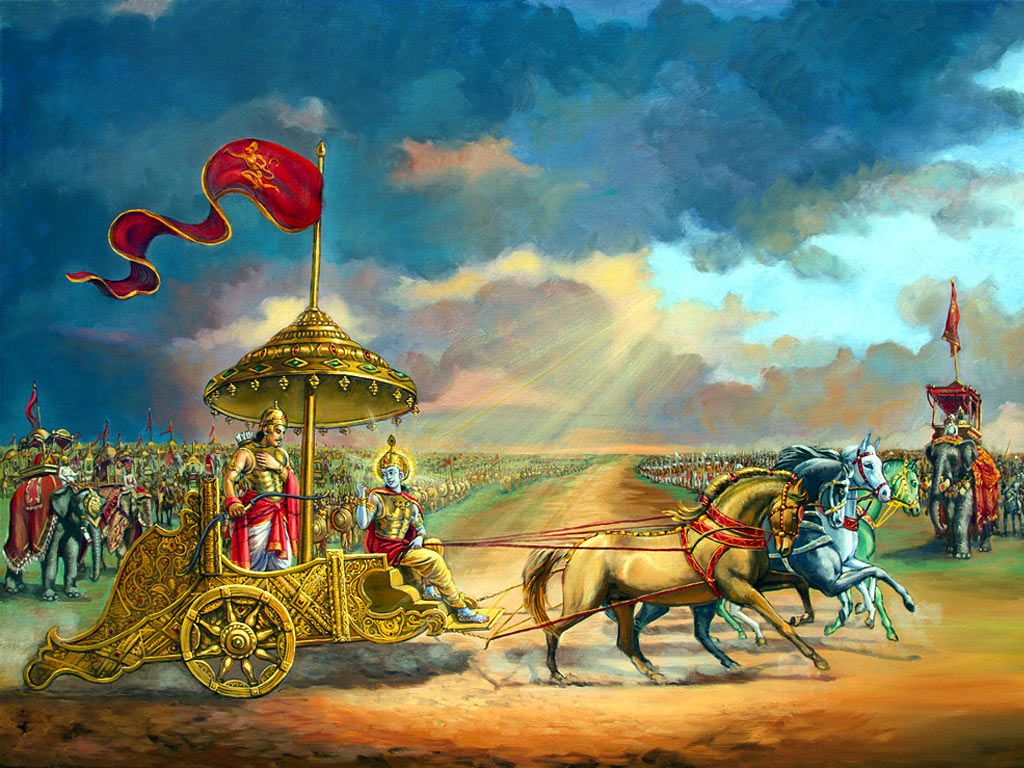|
The Shrimad Bhagavad Gita – Varnas or Caste-System ॥ श्रीमद्भगवद्गीता ॥ ॥ ॐ श्री परमात्मने नमः ॥ ॥ अथ श्रीमद्भगवद्गीता ॥ There is great deal of misconception about the varna-system (caste system) in Hinduism. It is important to recognize, Varna is not genealogical or by birth or hereditary but by profession. The four Varnas are not lineages, but categories. The Shrimad Bhagavad Gita describes the professions, duties and qualities of members of different varnas. Shree Krishna has clearly explained in chapters 14 and 18 of Shrimad Bhagavad Gita about distribution of duties and Varna-system (caste system). In Shrimad Bhagavad Gita (chapter 15, verse 1 & 2 of Purushottam Yoga), Shree Krishna advised that the Supreme Being, indestructible, permanent and eternal is root and main trunk is Brahma and universe is its branches. All human beings are created formerly by Brahma. Hence, there is no distinction of Varnas. This whole universe is Brahman. The Shrimad Bhagavad Gita thereafter recites a behavioural model for Varna based on attributes (gunas) of the persons. These attributes arise from Prakriti (Nature). Prakriti is the conceiving Mother, of which, three gunas viz. Sattva, Rajas and Tamas are arise and tie down the imperishable soul to the body (chapter 14, verse 5). There is no entity on earth, or again in heaven among the Devas, that is devoid of these three Gunas, born of Prakriti. The pre-dominance of the particular gunas say sattvika are to be of category Brahmanas irrespective of birth. The work or duties should be adopted according to in-born Gunas of the persons and the categories of work are described as Brahmanas, Kshatriyas, Vaishyas and Sudras. With the evolution of societies in human beings, the work distribution also developed for the better synergy and ease of life. All societies, organisations and countries are marked by work distribution based on the capabilities and aptitudes. The duties of the Person according to the nature are defined (chapter wise and verse-wise of Shrimad Bhagavad Gita) as under (the relevant Sanskrit verses of Bhagavad Gita are mentioned at the bottom):
Reference:
सर्वयोनिषु कौन्तेय मूर्तयः सम्भवन्ति याः । तासां ब्रह्म महद्योनिरहं बीजप्रदः पिता ॥ १४-४॥ सत्त्वं रजस्तम इति गुणाः प्रकृतिसम्भवाः । निबध्नन्ति महाबाहो देहे देहिनमव्ययम् ॥ १४-५॥ तत्र सत्त्वं निर्मलत्वात्प्रकाशकमनामयम् । सुखसङ्गेन बध्नाति ज्ञानसङ्गेन चानघ ॥ १४-६॥ रजो रागात्मकं विद्धि तृष्णासङ्गसमुद्भवम् । तन्निबध्नाति कौन्तेय कर्मसङ्गेन देहिनम् ॥ १४-७॥ तमस्त्वज्ञानजं विद्धि मोहनं सर्वदेहिनाम् । प्रमादालस्यनिद्राभिस्तन्निबध्नाति भारत ॥ १४-८॥ सत्त्वं सुखे सञ्जयति रजः कर्मणि भारत । ज्ञानमावृत्य तु तमः प्रमादे सञ्जयत्युत ॥ १४-९॥ रजस्तमश्चाभिभूय सत्त्वं भवति भारत । रजः सत्त्वं तमश्चैव तमः सत्त्वं रजस्तथा ॥ १४-१०॥ सर्वद्वारेषु देहेऽस्मिन्प्रकाश उपजायते । ज्ञानं यदा तदा विद्याद्विवृद्धं सत्त्वमित्युत ॥ १४-११॥ लोभः प्रवृत्तिरारम्भः कर्मणामशमः स्पृहा । रजस्येतानि जायन्ते विवृद्धे भरतर्षभ ॥ १४-१२॥ अप्रकाशोऽप्रवृत्तिश्च प्रमादो मोह एव च । तमस्येतानि जायन्ते विवृद्धे कुरुनन्दन ॥ १४-१३॥ Chapter 18: ब्राह्मणक्षत्रियविशां शूद्राणां च परन्तप । कर्माणि प्रविभक्तानि स्वभावप्रभवैर्गुणैः ॥ १८-४१॥ शमो दमस्तपः शौचं क्षान्तिरार्जवमेव च । ज्ञानं विज्ञानमास्तिक्यं ब्रह्मकर्म स्वभावजम् ॥ १८-४२॥ शौर्यं तेजो धृतिर्दाक्ष्यं युद्धे चाप्यपलायनम् । दानमीश्वरभावश्च क्षात्रं कर्म स्वभावजम् ॥ १८-४३॥ कृषिगौरक्ष्यवाणिज्यं वैश्यकर्म स्वभावजम् । परिचर्यात्मकं कर्म शूद्रस्यापि स्वभावजम् ॥ १८-४४॥ स्वे स्वे कर्मण्यभिरतः संसिद्धिं लभते नरः । स्वकर्मनिरतः सिद्धिं यथा विन्दति तच्छृणु ॥ १८-४५॥ यतः प्रवृत्तिर्भूतानां येन सर्वमिदं ततम् । स्वकर्मणा तमभ्यर्च्य सिद्धिं विन्दति मानवः ॥ १८-४६॥ श्रेयान्स्वधर्मो विगुणः परधर्मात्स्वनुष्ठितात् । स्वभावनियतं कर्म कुर्वन्नाप्नोति किल्बिषम् ॥ १८-४७॥
0 Comments
Leave a Reply. |

 RSS Feed
RSS Feed